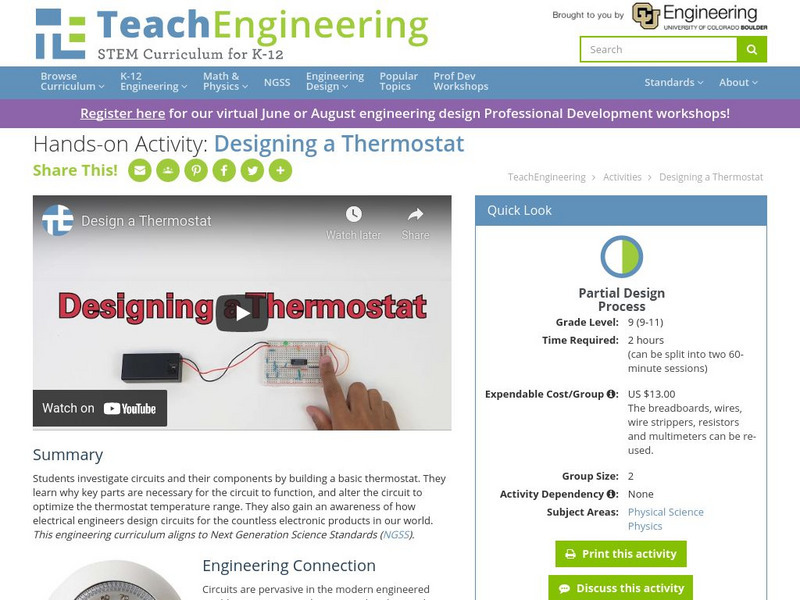TeachEngineering
Teach Engineering: Completing the Circuit
In the everyday electrical devices we use - calculators, remote controls and cell phones - a voltage source such as a battery is required to close the circuit and operate the device. In this hands-on activity, students use a battery,...
TeachEngineering
Teach Engineering: Pointing at Maximum Power for Pv
Student teams measure voltage and current in order to determine the power output of a photovoltaic (PV) panel. They vary the resistance in a simple circuit connected to the panel to demonstrate the effects on voltage, current, and power...
Science Buddies
Science Buddies: Sliding Light: How to Make a Dimmer Switch With a Pencil
In this electronics science fair project, students will make a simple dimmer switch and investigate the relationship between the resistance in the circuit and the amount of light produced. The Science Buddies project ideas are set up...
TeachEngineering
Teach Engineering: Designing a Thermostat
Students investigate circuits and their components by building a basic thermostat. They learn why key parts are necessary for the circuit to function, and alter the circuit to optimize the thermostat temperature range. They also gain an...
Curated OER
Physics4 kids.com: Electricity & Magnetism: Resistance
Simple line graph showing the inverse relationship between the amount of electrical resistance and the amount of work possible.
Science Struck
Science Struck: A Comprehensive List of All the Physics Formulas
Provides a long list of physics formulas for easy reference.
Learn AP Physics
Learn Ap Physics: Physics B: Circuits
A site dedicated to help students prepare for the AP Physics B test. This specific site reviews circuits including current, resistance, power, Ohm's law, batteries, DC circuits, transformers, and car coils. Site contains links to video...
ClassFlow
Class Flow: Electricity
[Free Registration/Login Required] Students can use this Flipchart to learn and apply Ohm's law to basic circuitry problems. Students are introduced to the relationship among voltage, current, and resistance, and then apply their newly...
University of Guelph
University of Guelph: Physics Tutorials: Dc Circuits: Resistors in Parallel
Explains and illustrates the meaning of parallel connections. Discusses the voltage-current-resistance relationships for parallel connections of resistors. An example problem on parallel calculations can be accessed from this page.
Georgia State University
Georgia State University: Hyper Physics: Resistor Combinations
At this site from Georgia State University parallel and series connections of resistors are explained and illustrated. Equations for computing the overal voltage, current, and resistance of such circuits are given and explained.
Physics Classroom
The Physics Classroom: Power Revisited
This tutorial visits the concept of power. You will learn to develop new equations that express power in terms of current, electric potential difference and resistance.
CK-12 Foundation
Ck 12: Physics Simulation: Power Lines
[Free Registration/Login Required] Learn about the relationship between electric potential, current, and resistance in the context of high-voltage AC power lines using this interactive simulation. A PDF worksheet and a video tutorial are...
CK-12 Foundation
Ck 12: Physics Simulation: Dollhouse
[Free Registration/Login Required] Learn about the analysis of parallel circuits in the context of a realistic household circuit using our interactive simulation. A PDF worksheet and a video tutorial are also available. [3:24]
CK-12 Foundation
Ck 12: Physics Simulation: Marquee Lights
[Free Registration/Login Required] Learn about different ways you can wire an electric circuit, and how the brightness of the lights depends on how they are configured using this interactive simulation. A PDF worksheet and a video...
CK-12 Foundation
Ck 12: Physics: Electrical Systems Study Guide
A study guide covering electrical systems.
Physics Classroom
The Physics Classroom: Current Electricity: Circuit Connections: Series Circuits
When two or more electrical devices in a circuit can be connected, it is considered a series connection or a parallel connection. When all the devices are connected using series connections, the circuit is referred to as a series...
Technology Student
Technology Student: Electronics Index
This site contains a wealth of material on electronics. Various components and techniques are thoroughly described and clearly illustrated.
Science Buddies
Science Buddies: Put Some Energy Into It! Use a Calorimeter to Measure
In this science fair project, use a calorimeter with an attached heating element to measure how water responds to added thermal energy.
Physics Classroom
The Physics Classroom: Current Electricity
Four complete lessons on current electricity in the study of physics. Lessons include informational text, interactive activities, animations, and quick, interactive comprehension checks.
Georgia State University
Georgia State University: Hyper Physics: Ac Circuits
A very comprehensive site organized well with many topics dealing with AC circuits.
Concord Consortium
Concord Consortium: Calculating Impedance
A short tutorial about calculating impedance.













